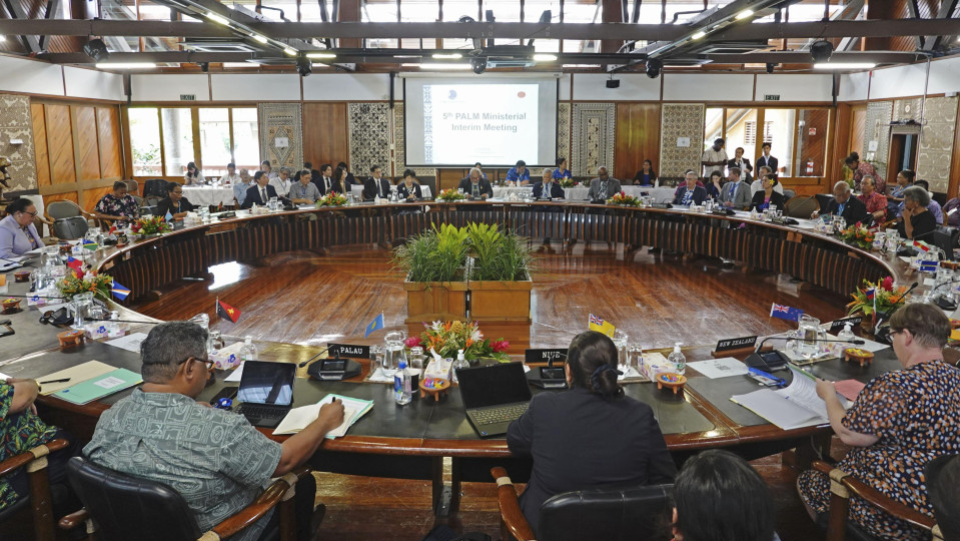Japan conducted its first-ever cybersecurity exercise with five Pacific island nations in February, apparently in cooperation with the United States, to ensure secure access to strategically important areas where China is expanding its influence. The aim is to build robust digital connections.
Security experts have hailed the recent events in Guam as significant, with some seeing it as Japan's first foray into cyber diplomacy with a Pacific island nation, but Fumio Kishida The Prime Minister said it was worth paying attention to when he invited the leaders of Pacific island countries to a summit in Tokyo in July.
The Feb. 18-26 session also focused on the United States and Australia's cyber defense capabilities, especially in the face of rising cyber attacks, especially in the Western and South Pacific, which are connected to Japan and other countries by undersea communications cables. The event was held as measures are being taken to improve the Tensions over Taiwan.
Hideyuki Shiozawa, senior program officer for Pacific Island countries at the Tokyo-based Sasakawa Peace Foundation think tank, said, “When it comes to cybersecurity, Pacific Island countries are what I would call 'soft bellies' and are not immune to cyber attacks. “It was very vulnerable.” .

A ministerial meeting between Japan and Pacific island countries will be held in Suva, the capital of Fiji, on February 12, 2024 (Kyodo News) ==Kyodo News
“Hackers could attack government networks and critical infrastructure in countries like Japan and Taiwan, for example, by going through those countries,” he said in an interview. “Providing technical training and providing antivirus software and other cybersecurity tools to these countries will also reduce security risks in other regions of the Indo-Pacific.”
The exercise, led by the Ministry of Internal Affairs and Communications, included government officials and carriers from Palau, Micronesia, the Marshall Islands, Nauru, and Kiribati. Fiji and Tonga also participated as observers.
According to a ministry official, the U.S. Cybersecurity and Infrastructure Security Agency (CISA) dispatched two employees, including an instructor, and provided training materials.
The official said participants conducted cyber defense taxes against possible malware attacks targeting key infrastructure and received cyber incident response training, and participants looked forward to Japan continuing this effort. He added that he had expressed that.
“This exercise effectively marks the beginning of Japan's cyber diplomacy toward Pacific island countries,” Shiozawa said. “Japan should work with the United States and Australia to expand this effort and, in some cases, institutionalize it.”
As part of its efforts to realize a free and open Indo-Pacific based on the rule of law, Japan is implementing a program similar to that of the Association of Southeast Asian Nations, and in 2018 established the Japan-ASEAN Cybersecurity Capacity Building Center in Thailand. launched.
Brad Grosserman, deputy director of the Center for Rulemaking and Strategy at Tama University in Tokyo, also called the exercise “important and valuable” at a time when Tokyo, Washington and Canberra are funding a 2,250km undersea cable project. “Yes,” he praised. Deliveries are scheduled for the second half of 2025 in Micronesia, Nauru, and Kiribati.
“It is impossible to overestimate the importance of cybersecurity to national security, economic vitality and resilience,” Grosserman said in an interview. “In order for countries to develop and grow in their own way, infrastructure must be strong. It is also important to support countries and not push them into China's arms.”
In a series of developments that have alarmed the United States and its allies in the region, Nauru severed diplomatic relations with Taiwan in favor of China in January, and recent reports indicate that Chinese police are operating in Kiribati. Following the report, Kiribati also switched its diplomatic recognition from Taipei to Kiribati. Beijing in 2019.
The Chinese survey vessel is operating without permission in Palau's exclusive economic zone and appears to be sailing on an undersea cable connecting Southeast Asia to the United States.
Grosserman also emphasized the importance of exercises with Pacific island nations and existing frameworks with ASEAN, particularly as China strengthens its preparedness for cyberattacks on the self-ruled democratic island of Taiwan. emphasized.
As Prime Minister Kishida said, “Today's Ukraine may become tomorrow's East Asia,” Russia's invasion of Ukraine reflects concerns about Beijing's territorial ambitions regarding Taiwan and the Japan-administered Senkaku Islands in the East China Sea. Raised the level rapidly.
Last September, Japan's National Police Agency and the National Cybersecurity Incident Preparedness Strategy Center joined U.S. response agencies, warning that China-linked cyberattackers, known as blacktech, were targeting a wide range of public and private sector organizations in the U.S. and East Asia. Warned about malware attack. entity.
“Black tech attackers are targeting the government, industry, technology, media, electronics, and communications sectors, including organizations supporting the U.S. and Japanese militaries,” they said. said in a joint statement with the federal agency. of investigation.
In May 2023, Microsoft announced that the Chinese hacker group Bolt Typhoon was targeting U.S. infrastructure, including Guam, and that state-sponsored hackers had “developed the ability to disrupt critical communications infrastructure between the U.S. and the Asian region.” “We are pursuing it,” he warned. future crisis. ”
Despite concerns over cybersecurity and geopolitical issues, analysts say Japan's communications ministry announced the exercise as a capacity-building measure, with little reference to its strategic significance amid a power struggle between the great powers. He points out that it was a shrewd thing to do.
They argue that Japan's regional initiatives would be more welcome if they did not force participating countries, whether Pacific island states or ASEAN members, to choose between the Japan-U.S. alliance and China.
“Perhaps they wanted to downplay regional competition with China,” Grosserman said. “This is in line with Japan's traditional approach to regional assistance, this time focusing on areas of concern to Pacific island countries, which opponents call part of competition with China. You’re denying yourself an opportunity.”
Related coverage:
Focus: Strengthening regional cybersecurity, essential in a connected world
Focus: US nuclear legacy leaves Marshall Islanders in 'death exile'


